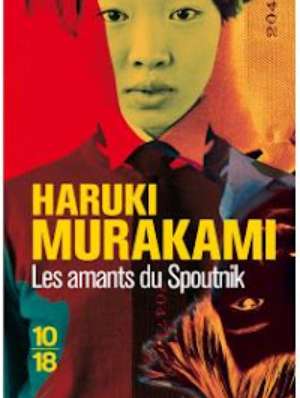"My Love, Sputnik" by Haruki Murakami from Alina Travel's blog
 I've heard a lot of talk about Murakami, but I couldn't bring myself to read it. I fell in love with his style a few years ago, when I found the book "In the night" at the library.
I've heard a lot of talk about Murakami, but I couldn't bring myself to read it. I fell in love with his style a few years ago, when I found the book "In the night" at the library.
Last year, taking a Sunday walk, I found 3 of his volumes at a flea market: Murakami for 50 cents!
Today we will talk about "My Love, Sputnik" or "Les amants du Spoutnik" - the title in French.
I have to admit that after reading, the title in Romanian seems more appropriate, closer to the truth.
The thread of the narrative is woven around 3 main characters:
K - who is also the narrator, a young man of almost 25 years, a teacher, passionate about reading, he meets Sumire while still a student, falls in love with her, but expresses himself love through true friendship.
Sumire - a 21-year-old rebel who dreams of becoming a writer, drops out of college and dedicates herself entirely to her passion for writing. Her only reader is K, the one who knows her best. In the love chapter, Sumire cannot understand what people who love feel until she meets Miu at a wedding. Then she understands why she hasn't been attracted to any man so far - because she likes women.
Miu - is a business woman 16 years older than Sumire, she likes the young woman's way of being and offers her to be his personal assistant. Sumire accepts, and shortly accompanies Miu on a business trip to Europe, which ends with a vacation on one of the Greek islands, where the two become confidants. Sumire reveals her feelings of love and sexual attraction, and disappears that same night, as if she had evaporated, after being rejected by Miu.
The search operations have no success, the resignation overwhelming Sumire's relatives. K's universe is no longer the same, he lost a part of it with this disappearance, but he hopes that maybe somewhere in a parallel world, which Sumire describes in the last two written texts, he has his place next to her she. Everything until the day when his phone started ringing and on the other end of the line was Sumire, who came back and tells him to come and get her, because she has so many stories...
A mixture of reality and fiction that awakens question marks and motivates you to delve deeper into the reading.
I was impressed by this book and by the fact that Murakami mentions Moldova twice: "- Tu te sens bien? - Aussi bien que la Moldova au printemps." (-Do you feel good? - Just as good as Moldova in the spring.) and "-Aussi réelle que la Moldova? - Aussi réelle." (-As real as Moldova? -Also real.).
PS I found out today that the French translation is not exact, so that the Romanian and English translations do not talk about Moldova, but about the Moldau river. I apologize to the readers whom I misled!
Why Sputnik? I'll let you discover for yourself!
Enjoy your reading!

The Wall